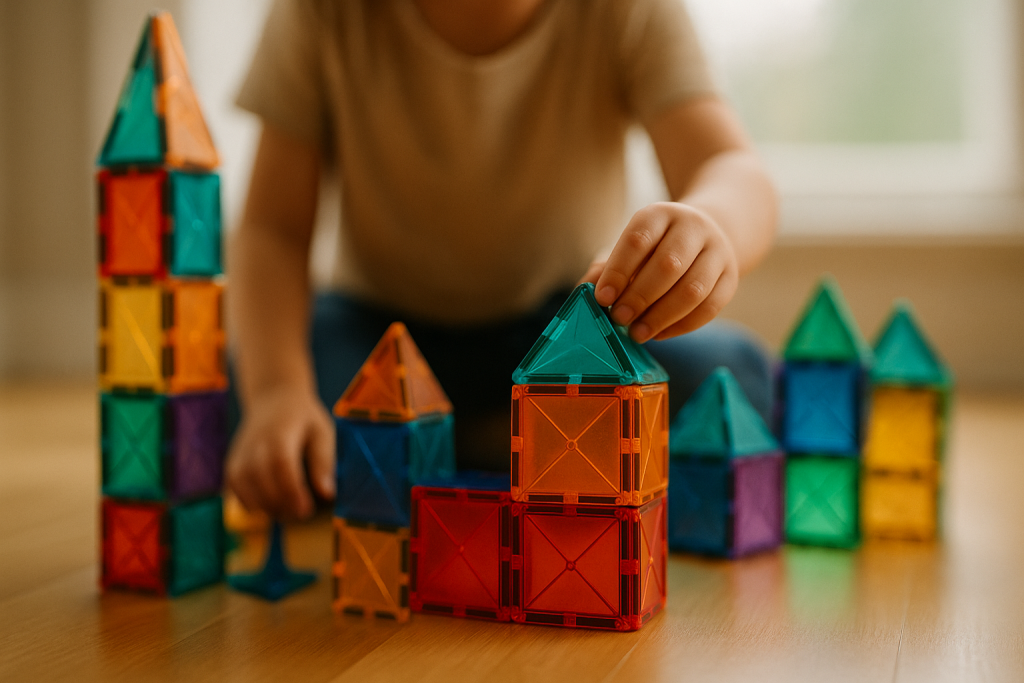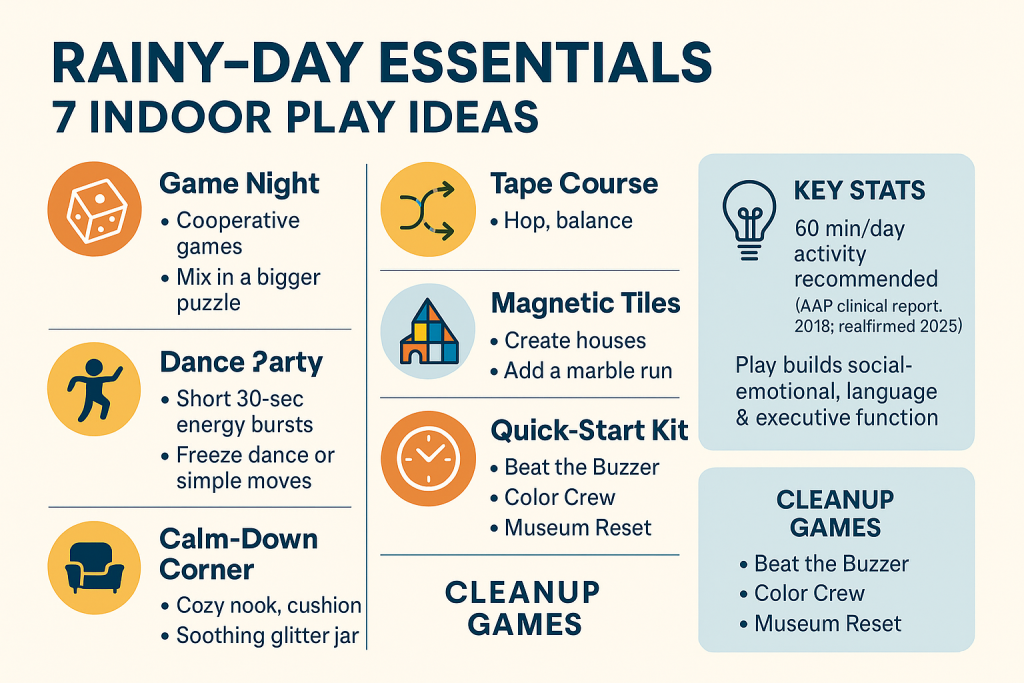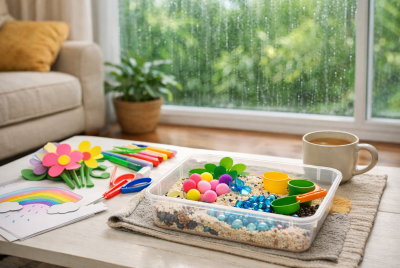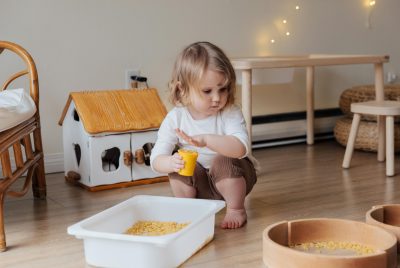Rainy-Day Essentials: 7 Indoor Play Ideas That Beat the Weather Blues
We may earn a commission for purchases made using our links. Please see our disclosure to learn more.
We’ve all had that day—the sky is sulking, the kids are wired, and you can feel Movie Day morphing into “the third sequel.” Breathe. With a few smart Indoor Play Ideas, you can channel all that energy into fun, focus, and real connection—without a panic run to the craft store.
Affiliate Disclosure: I may earn a commission from qualifying Amazon purchases.
1) Build-a-Fort Architects
Blankets, chairs, clothespins, and fairy lights = instant clubhouse. Add “rooms” (reading nook, café counter) and a cardboard “mailbox” for secret notes. This simple setup transforms a living room into an invitation for pretend play, storytelling, and cozy self-regulation.
How to set it up fast
- Use a sheet as the roof and a heavier blanket as “walls.”
- Clip edges with clothespins or binder clips.
- Add a flashlight, pillows, and a stack of picture books.
What kids learn
Spatial thinking, planning, empathy (“Welcome to our shop!”), and language skills. These screen-free activities also lower the household volume—forts feel like quiet zones.
Try these variations
- Space station: label “modules” (Lab, Sleep Pod, Greenhouse).
- Bookstore: price tags, play money, paper “receipts.”
- Café: menu, “order window,” and a pretend sink (bowl + towel).
2) Magnetic-Tile Cities
Magnetic tiles turn the floor into a mini-STEM studio: bridges, rockets, marbles-through-tunnels. Challenge your child to build a tower that survives a gentle table shake (safely!). These STEM activities nurture perseverance and early engineering.
Quick wins
- Build on a baking tray to contain pieces.
- Make prompt cards: “Bridge a 12-inch gap,” “Build a home for a tiny animal.”
Sneaky skills
Symmetry, balance, counting sides, and collaborative planning—perfect for indoor activities for kids of different ages working side-by-side.

3) Tape-Line Obstacle Course
Painter’s tape becomes balance beams, hopscotch, zigzags, and a final “parking spot” for a stretch pose. This is the go-to for gross motor skills on soggy afternoons.
Add movement—without chaos
- Run timed laps (30–45 seconds).
- Do animal walks: bear, crab, frog.
- End each lap with three belly breaths.
Why it helps
Kids meet movement needs indoors, which supports focus and mood later. For tight spaces, use hallways, door frames (targets), and “one-foot islands.”
4) Kitchen Science Lab (Safe & Simple)
Keep a small bin with baking soda, vinegar, food coloring, cornstarch, and raisins. Your rainy-day lab is ready for hands-on learning.
Low-mess experiments
- Dancing Raisins: carbonated water + raisins shows buoyancy as bubbles lift and drop.
- Oobleck: cornstarch + water makes a non-Newtonian goo (solid under force, liquid at rest).
- Mini volcano: baking soda + vinegar in a deep tray or the sink.
Talk it out
Make a guess → test → “What changed?” You’re modeling the scientific method in kid-sized steps and anchoring curiosity to everyday items.
5) Family Game Night Remix
Choose cooperative board games where everyone wins together—or add house rules to level the playing field for mixed ages. Snack bowls and team names boost buy-in.
Keep momentum high
- Rotate “game captain” duties.
- Spotlight effort: “Great strategy!” beats “You’re the best.”
- Insert “movement breaks” between rounds (10 jumping jacks, 3 yoga poses).
Why it works
Games build turn-taking, flexible thinking, and emotion regulation—key social skills hiding inside rainy day activities.

6) Music & Dance Party
Blast a kid-friendly playlist. Try freeze dance, rhythm echo (clap back the pattern), or “DJ-for-a-day” where everyone picks a track.
Micro-structure = maximum fun
- 2 high-energy songs → 1 quiet song for stretches.
- Give each dancer a scarf for flowy movement and dramatic stops.
- Try call-and-response moves: “Slide… jump… pause!”
Skill boost
Coordination, timing, self-expression, and confidence—plus everyone gets the wiggles out indoors.
7) Calm-Down Lab
Create a “yes” space for feelings: a small basket with a fidget, a squishy, a picture book, and a glitter jar. Let kids help choose what goes in.
Why it matters
When kids can choose a calm tool, they practice regulation—not repression. That choice builds real-life coping strategies for school, sports, and sibling spats.
Try this prompt
“What helps your body feel safe right now—squeeze, shake, or slow breathing?”
Indoor Play Quick-Start Kit (5 items to stash)
Painter’s tape • Balloons • Move-card deck (jump, balance, toe-touch) • Two puzzles • A favorite picture book
These bits let you launch toddler indoor games or big-kid challenges in under five minutes.
Keep the Day Moving (without over-scheduling)
A flexible rhythm keeps everyone sane: Create → Move → Quiet → Snack → Repeat. If you like a seasonal routine, this gentle guide to a flexible summer rhythm keeps structure light and kid-friendly: sample summer schedule with simple blocks and cues.
🔹 Amazon Product Picks: Small Things, Big Play (Screen-Free)
Below are five parent-favorite staples that pair beautifully with these Indoor Play Ideas. Each includes features, pros/cons, and a quick “who it’s for.”
MAGNA-TILES Classic 100-Piece Magnetic Construction Set
Why we love it: Open-ended, durable, and scales from toddler towers to big-kid engineering.
Features: 100 translucent geometric tiles in multiple shapes; strong magnets for stable builds (per listing).
Pros: Creativity powerhouse; excellent for siblings.
Cons: Needs a flat surface; not a budget buy.
Best for: Ages 3+; STEM-curious kids; build challenges.
Review snapshot: Parents praise longevity, replay value, and imaginative play.
Kinetic Sand Construction Site Folding Sandbox (2 lbs)
Why we love it: Sensory calm with purposeful jobs (dig, mold, demolish).
Features: Folding case, dump truck with brick mold, working crane with wrecking-ball and bucket attachments; includes 2 lbs of sand.
Pros: Contained play; sand never dries out; easy setup.
Cons: Use a mat—grains wander.
Best for: Ages 3+; sensory seekers; quiet bins.
Review snapshot: “Hours of focused play,” frequent kudos for the fold-and-store design.
GONGE River Stones (Original Set)
Why we love it: Transforms halls into balance trails—movement without mayhem.
Features: Non-slip stepping stones in varied heights/angles; stackable; designed for balance and coordination.
Pros: Durable; endless course designs; indoor/outdoor.
Cons: Needs some floor space; supervise toddlers.
Best for: Ages 3+; gross-motor obstacle courses.
Review snapshot: Consistent praise for quality and motor-skill gains.
Little Tikes 3′ Trampoline (with Handlebar)
Why we love it: Safe bounce outlet for wiggles between workbook pages.
Features: Indoor-only mini-trampoline with stability handlebar and large jumping surface; easy to move.
Pros: Compact; great for regulation breaks.
Cons: One jumper at a time; “no flips” rule is a must.
Best for: Apartments; energy bursts; sensory diets.
Review snapshot: Popular rainy-day energy saver and a parent favorite for short activity bursts.
Fat Brain Toys Squigz Starter Set (24-Piece)
Why we love it: Satisfying POP! suction builders that stick to windows, trays, and each other—fantastic for fine motor skills.
Features: 24 pieces in eight shapes; 100% food-grade silicone; BPA/latex-free.
Pros: Dishwasher-friendly; travel-ready; low-mess.
Cons: Works best on very smooth surfaces.
Best for: Ages 3+; fidgeters; car-seat/airplane kits.
Review snapshot: Parents and therapists note attention-holding, tactile fun.
At-a-Glance Comparison
| Model | Key Spec(s) | Warranty | Approx Price/Tier | Best For |
| MAGNA-TILES 100-pc | 100 magnetic tiles; multi-shape builds | Varies by seller/manufacturer | $$$ | STEM, multi-age builds |
| Kinetic Sand Construction | Folding case; crane & truck; 2 lbs sand | Varies by seller/manufacturer | $$ | Sensory + quiet focus |
| GONGE River Stones | Non-slip, varied heights; set of 6 | Varies by seller/manufacturer | $$ | Gross-motor courses |
| Little Tikes 3′ Trampoline | Indoor mini-tramp w/ handlebar | Varies by seller/manufacturer | $$ | Energy bursts, regulation |
| Squigz Starter (24) | Silicone suction builders | Varies by seller/manufacturer | $ | Fine-motor, travel kits |
How to match products to play:
- Fort + Calm-Down Lab: add Squigz to windows for quiet building corners.
- Magnetic-Tile Cities: pair with prompt cards for bridges & ramps.
- Tape Course: finish with River Stones “final boss” jumps.
- Movement breaks: trampoline as a 60-second reset between games.
Product Comparison Notes (Picking what you need)
If you want open-ended longevity, pick MAGNA-TILES. If you need sensory regulation, start with Kinetic Sand. For gross-motor play in small spaces, combine GONGE River Stones with short-burst trampoline sessions. When you want low-mess creativity, Squigz shines on windows and trays. These tools stretch across ages and attention spans, which means fewer forgotten toys and more replay.
🧪 Research-Backed: Why Indoor Play Is a Big Deal
- Play literally builds brains. The American Academy of Pediatrics emphasizes that developmentally appropriate play supports social-emotional growth, language, executive function, and stress buffering—so much so that pediatricians endorse “a prescription for play.” (Clinical Report; reaffirmed January 2025.) In short: play isn’t a time-filler; it’s foundational. American Academy of Pediatrics clinical report on the power of play. AAP Publications
- Kids need daily movement (indoors counts). Guidance from global and national health agencies notes that children and adolescents should average at least 60 minutes per day of moderate-to-vigorous activity; playful mini-bouts add up across the day. WHO physical activity fact sheet (2024). World Health Organization
For a simple US-focused summary, the CDC echoes the same 60-minutes-daily guidance. CDC: Child activity overview (2024). CDC
Takeaway: Your living room can meet play and movement goals—supporting attention, mood, coordination, and resilience.

Inclusivity & Small-Space Tips
- Go vertical: Squigz on windows, painter’s-tape targets on doors, magnet play on baking sheets.
- Create parallel stations so toddlers can tinker while older kids problem-solve.
- Rotate “role leadership” (builder, DJ, scientist) to share power and boost engagement.
- Invite cultural perspectives: food shop play, greetings in other languages, music from different regions.
Safety & Low-Mess Habits
- Clear sharp edges; keep jumps low for obstacle and trampoline play.
- Lay a mat or towel under sensory bins and kinetic sand.
- Use a two-rule mantra: “No jumping from furniture” + “Everything back to base after.”
- For fine motor bits (beads, tiny tiles), set a “tray boundary” and a simple count-back routine at cleanup.
Clean-Up Games (because future-you deserves a break)
- Beat the Buzzer: one song = all toys in bins.
- Color Crew: each helper collects one color of pieces.
- Museum Reset: restore the room like a “gallery,” then do a quick “tour” to admire.
FAQs
What are the quickest Indoor Play Ideas when I have 5 minutes?
Keep a “Rainy-Day Kit” ready: balloons, painter’s tape, a movement-card deck, crayons, and one puzzle. Balloon volleyball + a tape hopscotch can be live in two minutes.
Which Indoor Play Ideas are best for tiny apartments?
Use vertical and contained play: Squigz on windows, magnetic tiles on a tray, painter’s-tape targets on doors, and one gross motor stepping challenge using River Stones that stores in a bin.
How do I involve toddlers and big kids together?
Set parallel challenges: the older child designs a magnetic bridge while the toddler stacks tiles; then switch roles with a new prompt. Praise teamwork and process, not just the final build.
How can I make indoor play active without chaos?
Alternate short movement bursts (30–60 seconds) with calm activities. Tape courses, yoga poses, beanbag tosses, and trampoline breaks channel energy safely and reset focus.
My child resists new activities—help?
Offer two choices (“A or B?”), model the first minute with them, and celebrate effort (“You tried a new balance path!”). Keep day-one sessions short and upbeat, then build stamina.
Wrap-Up: You’ve Got This 💛
Rain may win the forecast, but it doesn’t get to run your day. Start with one of these seven Indoor Play Ideas—a fort, a tape course, or a tiny kitchen lab—and let curiosity lead. Small, simple setups spark big connection. Future-you, sipping something warm while the kids are immersed, will be very pleased.




